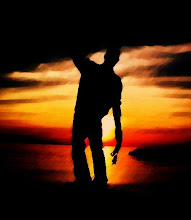While 2014 has not been my favorite year that I've had the pleasure of living through, there is something to be said for times of disappointment, trials, fear, and difficulties. Although we typically do not seek out the valleys of life, nor do we particularly enjoy living through them, there is much to be learned in our journey through them. Here are some things I've learned throughout the whirlwind that has been 2014:
Even in the darkest moments of despair, always look for the light. It is there, and though it may not always be burning brightly from all around you, it is there nonetheless. My bright spots this year have been the never-ending love and support shown to me by my beautiful family and friends. Who knows where I would be without them. I'm glad that I don't even have to imagine what that would be like.
Even when the journey seems impossible, keep going. 2014 has been a long, dark, and winding road without an end. But yet, December 31st has arrived. The snow is glistening outside on the lawn and the sun is warmly shining (even if it is only a mere 22 degrees outside right now). Each and every journey, no matter how big or small, begins and is completed one step at a time. Each step, whether the first one, the one stuck in the mud, the one that drenches your foot in a puddle, the one that twists your ankle, or the one that crosses the finish line, is necessary to complete the journey. When life seems too big or too dark or too hard, remember to put one foot in front of the other and "just keep swimming" (or walking).
Choose happiness. Even when we set our sights on the bright spots in our lives or taking one day at a time, it can still be all too easy to focus on the pain and suffering. The difficulties of life that bring us all down zap us of energy and drain our mental and emotional spirits with ease. Choosing happiness requires us to refocus and concentrate on what is truly important. It is a conscious decision that may need to happen more than once a day. I'll be the first to admit that I've not been the best at doing. In fact, I've flat out sucked at doing it many a day. It's hard. And choosing happiness doesn't mean that it's not okay to be sad or experience sorrow or pain or loss or anger. It simply means choosing not to live every day consumed by those emotions. As one of my favorite people constantly reminds me, "It's okay not to be okay. It's not okay to stay that way."
As we get ready to close out the remaining hours of 2014 and usher in 2015, I'm reminded of God's promise for redemption. What greater sign of restitution and grace is there than the cross, where out of wounded hands, redemption was provided for the lonely, the broken, the depraved, and the hopeless. The valleys of life are not comfortable. But where one is comfortable, one does not grow. In 2015, I'm looking forward to seeing more bright spots, taking each step in my journey with meaning and purpose, and choosing happiness in the face of trials.
Paz y amor,
JMF
Bedside manner needs work
11 years ago
